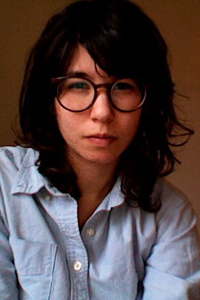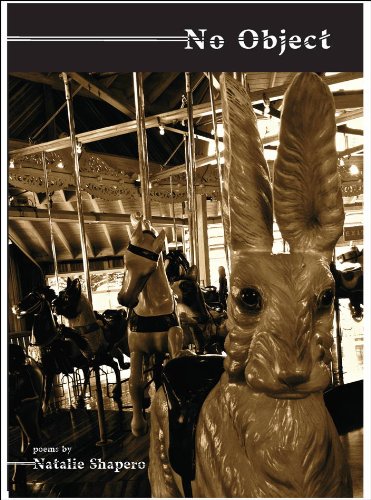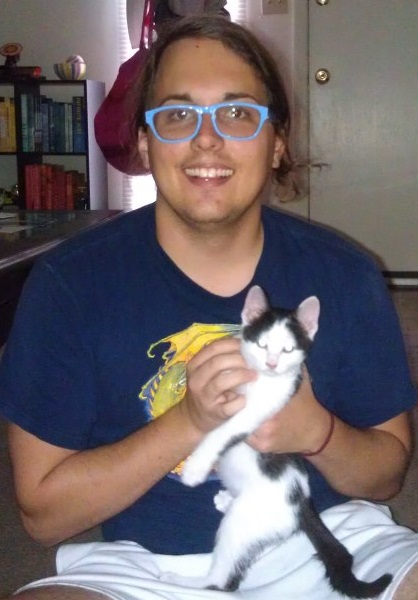Author Spotlight
Natalie Shapero Talks with Rob Stephens About Her New Book NO OBJECT
Cue up the Boss, now, folks. Put on your best dancin’ kicks and turn out the lights. Recommended drink: Black Russian. Natalie Shapero, with her new book No Object, is about to walk on your computer screen and dish info about her poems, thievery, serrated stage knives, and other amazing platitudes.
I bought No Object in Boston, read it on the plane ride home, and knew I wanted to talk to Natalie about it. Thanks to Chris Higgs and HTMLGiant for giving me the forum to do so. Enjoy Natalie’s spitfire — I imagine you’ll be hearing her name a lot more in the future.
– Rob Stephens
Rob Stephens: What music video or internet meme do you think is most fitting for this interview?
Natalie Shapero: You know, I have been listening to this song a bunch lately, following a realization that it could be about writing. At the very least, it has a part where he’s frustrated because he’s cooped up trying to write a book. Writing a book is not what he needs, though—he needs a LOVE REACTION. I recommend doing the dance, too, for maximum punch.
RS: The title of your book is No Object. But if your book was an object, what would it be and why?
NS: Faye Driscoll, a really amazing choreographer, came through Ohio last weekend with her current project, “You’re Me.” There’s a part where the dancers are stabbing one another with one of those stage knives, the kind where the blade retracts into the handle on contact. It was a really good-looking knife—even appeared (at least from where I was sitting) to be serrated, meaning someone put some real work into the look, a lot of suggested messiness for a blade that doesn’t actually do anything. I felt a real kinship with that. So, yeah: serrated stage knife, that’s the object.
RS: In the very first poem of No Object, the speaker complains, “I hate my ugly mouth.” That phrase stuck with me throughout the book because the speaker often regurgitates words and phrases she sees and hears, from signage on license plates and washers to quotes from Shakespeare and Henry Ford. Why is this re-appropriation important to your work (or is it?)?
NS: Yeah, signage is a big thing. I was just discussing with a friend how I don’t think I could ever get a tattoo that included words, because words seem to me so much more indelible than pictures. I sort of think of signs in this manner, a word tattoo on the skin of the world. I’m much more attuned to the text of a landscape than I am to its visual elements. As an example: I read a lot about protest movements and watch a lot of documentaries. etc., and there are so many incredible photos and bits of footage of throngs of people in the streets, but somehow I only carry away with me the chants.
RS: You use wordplay like a sword. Like a crazy mad remixin’ DJ with a vengeance: “Give a man an inch, he thinks he is a ruler,” you say. How do you do it?
NS: Largely through the time-honored tradition of thievery! Actually, I cribbed “Give a man an inch, he thinks he is a ruler” from a real piece of woodcut art, displayed for sale in the Golden Hobby Shop in Columbus, Ohio. This is a phenomenal store that sells crafts made by senior citizens in a kind of consignment arrangement. There was another sign by the same artist that didn’t make it into the book—it read, “WOMEN LIKE WINE GET BETTER WITH AGE.” We all had a nice time mentally punctuating it to yield various meanings.
A lot of the wordplay in the book has to do with measurement. At the time of writing it, I was reading about the federal effort, during the 70s and 80s, to convert the U.S. to the metric system. It’s really an intense story of fear and failure. (Actually, an earlier version of this manuscript was called Metric America. I ended up junking it in favor of a graver name, but I was attached to Metric America in part because the two words are almost anagrams of one another, but not actually–a feigned companionship.) For a while there, I was keeping track of any quotes or aphorisms that referenced either metric or standard measurement. Many of these made it into the book as starting points for wordplay, like Andy Warhol’s directive DON’T PAY ANY ATTENTION TO WHAT THEY WRITE ABOUT YOU. JUST MEASURE IT IN INCHES. This refers to newspaper column space, obviously, but also it’s readily used, as in the book, for sexual sniping.
RS: Your speaker often seems to be self-deprecating, like she thinks she is something less, a “Copy of a copy,” as she says in “Bad Key.” Do the poems serve to redeem her, or merely to validate that self-deprecation? Or is she secretly the happiest person in the world?
NS: This is a very good question. Yes, one of the main themes of the book is self-hatred and its origins. Writing the poems, I was really committed to living inside feelings of worthlessness. Not that I recommend this as a writing strategy—Frank Lloyd Wright used to joke that he had back problems from sitting in his own chairs, and at times it has occurred to me that maybe I shouldn’t live so much in these poems for fear of breaking my own spirit or something. But in any case, yes, I am very interested in the phenomenon of degradation and how that gets internalized. One thing I always wonder is when self-hatred began. I mean when in human history. It’s something I want to know but am unsure how to learn. [Note: my partner, from his desk on the other side of the office room, calls over that Nietzsche might offer the answer. I’ll investigate further and let you know if this pans out.]
I went to a talk on fables a little while ago, and the speaker was commenting on how the conventional wisdom about Aesop at the time was that he was deeply physically ugly. Apparently, many of his contemporaries commented on this in their public and private writings. One guy called him BREAD-OF-LOAF-HEADED. This kind of insult is a very individualized thing, but also the sting is so ubiquitous. I mean, even The Boss wants to CHANGE MY CLOTHES MY HAIR MY FACE.
RS: Your use of rhetoric — it feels angular, like you have a sideways approach to skinning the skunk. For example, take the poem title “A Cup, the Amount of Blood in a Human Heart”; to get to the heart, you go through the cup and blood first. Does your brain work differently than everyone else’s? How do you make sideways seem like it’s the most direct way?
NS: It’s weird—I used to have this idea that I was a poet because I’m good with words. But gradually I came to realize that in fact I am drawn to poetry because I’m sort of terribly afraid of straightforwardness, and obfuscation and circuitousness are often the only real routes to me saying what I mean. I suppose I’m just describing now what everybody already knows about metaphor, the false front. I think a lot about Odysseus, returning home in his disguise and fooling everyone but the old dog, who was untroubled by the switch and knew immediately. I’ve been that dog for other writers, master decoder on a dung pile. I hope some people will be that dog for this book.
RS: Can you give me the recipe for creating a Natalie Shapero title?
NS: I keep a lot of lists, and one of these lists consists of phrases that sound like other phrases but aren’t quite, or phrases that, when excerpted from their context, take on an internal logic that isn’t otherwise there. That’s how I get many of my titles. Maybe this is part of the same sideways or one-off strategy we were talking about above. I’ve been writing a poem over the past few weeks that is, in part, about a short report I heard on radio news, on a health segment. In my notes for the poem, just jotting down the aboutness, I had referred to this show as “radio science,” and I just have now realized that it more evokes the existing phrase “radio silence.” You know, as in an unsettling lapse in communication. So I thought, OK, “Radio Science” can be the name of the poem, insofar as it’s kind of two names in one. Conservation, it will save the world!
RS: What are 5 reasons people should read No Object, and what is 1 reason people shouldn’t (second part optional if you have a snarky answer — I think everyone should read your book)?
NS: 1. You should read it because it’s short, so by the time you decide whether or not you want to read it, you’ll already have read it.
2. You should read it because it includes a weird Abraham Lincoln quote, and last year was the Year of Lincoln, and you have a problem where you live in the past.
3. Actually, a friend of mine was giving a talk the other day, and he used this particular Lincoln quote in his talk, with the caveat that Lincoln probably didn’t actually say it. And I realized that the reason he disbelieved the quote was that he had first encountered it in my book, which lent the quote an air of untrustworthiness. This made me feel good. So you should read the book because it makes things that are likely real seem likely imagined.
4. You should read it because it is kind of interactive, if you’re into that. One poem asks the reader, in the middle, “Do you know the book I’m thinking of?” And another friend of mine was just reading it and texted me with a guess! AND HE WAS RIGHT. That’s how you know it’s a true friendship. (Also—spoiler alert—the answer to this question is in the back.)
5. You should read it because a conventional means of testing a dog’s intelligence is to throw a blanket over its head and then measure how long it takes the dog to emerge from under the blanket. Clearly, you can test your own intelligence by putting this book on your face and then seeing how long it takes you to get away. I guarantee results.
OK, you should NOT read it to punish it for failing to include the following unwritten poems, hastily conceptualized and enumerated on a long-standing piece of lined paper in my office: SHOW TRIAL, TROLL DOLL, THEY SAID IT WOULDN’T LAST, THE STONE AGE DID NOT END FOR LACK OF STONE. Doesn’t that sounds like the makings of a better book than this one?
———
Natalie Shapero is currently the Kenyon Review Fellow at Kenyon College. She received her J.D. from The University of Chicago Law School in 2011, and her MFA from The Ohio State University in 2008. Her poetry has appeared in The Kenyon Review, Poetry, Believer, New Republic, and elsewhere. Her full-length collection, No Object, was published by Saturnalia Books in 2013.
Rob Stephens is an MLIS student at Florida State University. He received his MFA from Florida State University in 2012. His poems have appeared in Minnesota Review, Rattle, New Delta Review, and elsewhere. More about Rob at www.robthepoet.com.



